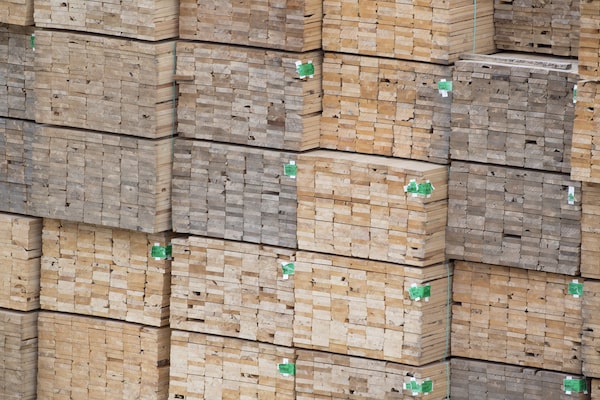
Softwood lumber is pictured in Richmond, B.C., Tuesday, April 25, 2017. British Columbia forestry company Canfor says it is "restructuring" its operations in the province, permanently closing one sawmill and shuttering another for an extended period amid plans to build a new wood manufacturing facility. THE CANADIAN PRESS/Jonathan HaywardJONATHAN HAYWARD/The Canadian Press
Canfor Corp. CFP-T is shutting two B.C. sawmills and plans to lay off more than 400 unionized workers as the company restructures to cope with dwindling timber supplies.
Canada’s second-largest lumber producer will be closing its sawmill and pellet operations in Chetwynd in northeast B.C. and shuttering its sawmill in Houston in the province’s Northern Interior.
“It’s a kick to the gut,” Jeff Bromley, chair of the wood council at the United Steelworkers, said in an interview on Thursday.
While there will be severance packages, the pending layoffs will hit younger workers especially hard, he said.
About 130 unionized employees work at the Chetwynd site and another 290 union members are based in Houston. A total of 50 non-union staff at the two locations also will be affected.
“Severance is a stop-gap measure, right? It doesn’t pay off mortgages, and for the folks in Houston and in Chetwynd, it’s hard to just sell your house,” Mr. Bromley said.
Vancouver-based Canfor is studying the economic feasibility of building a new facility at the Houston site for value-added wood processing, with a redevelopment decision slated by mid-2023.
The union estimates that once the available inventory of wood fibre is depleted for the two sawmills, the lumber operations will wind down by April. Even if a new value-added manufacturing plant is eventually built in Houston, it would likely employ fewer than 100 workers, Mr. Bromley said.
Canfor chief executive officer Don Kayne described the restructuring as difficult but necessary. “Our goal is to match our mill capacity with the economically available fibre for harvest to enhance our ability to compete and to operate throughout the market cycles,” he said in a statement.
B.C. billionaire Jim Pattison owns more than 51 per cent of Canfor.
BMO Capital Markets analyst Ketan Mamtora said the pending removal of 750 million board feet of annual production capacity represents almost one-quarter of Canfor’s B.C. sawmill capacity.
With pulp mills relying on wood chips from sawmills, Mr. Mamtora said there will be a ripple effect. “As sawmill production reduces over time in B.C., it is likely to put further pressure on pulp production in the region,” he said in a research note.
Two weeks ago, Canfor announced that it will be shutting a pulp line at a mill in Prince George, B.C., by the end of March, affecting nearly 300 workers.
B.C.’s forestry sector is still feeling the impact of mountain pine beetles, with forests decimated by the insects in the province’s Interior for about 12 years, starting in 1999. Companies managed to salvage trees damaged by beetles but still in good enough condition for harvesting. Those supplies have been depleted.
B.C. wildfires, notably in 2017 and 2018, further eroded supplies of wood fibre.
The B.C. government controls the amount of trees that producers chop down on Crown land, in what’s called the annual allowable cut. “In the Houston area, the annual harvest has declined by more than 25 per cent, compared to 2008 during the height of the beetle epidemic,” B.C. Forests Minister Bruce Ralston said in a joint release with B.C. Jobs Minister Brenda Bailey.
Mr. Bromley said that while timber constraints are the major reason behind the pending shutdowns, it didn’t help that the U.S. continues to slap tariffs against Canadian softwood shipments south of the border.
Earlier this week, the U.S. Department of Commerce said it will be raising the duty rate imposed on West Fraser Timber Co. Ltd., Canada’s largest lumber producer, and on Canfor, effective this summer.